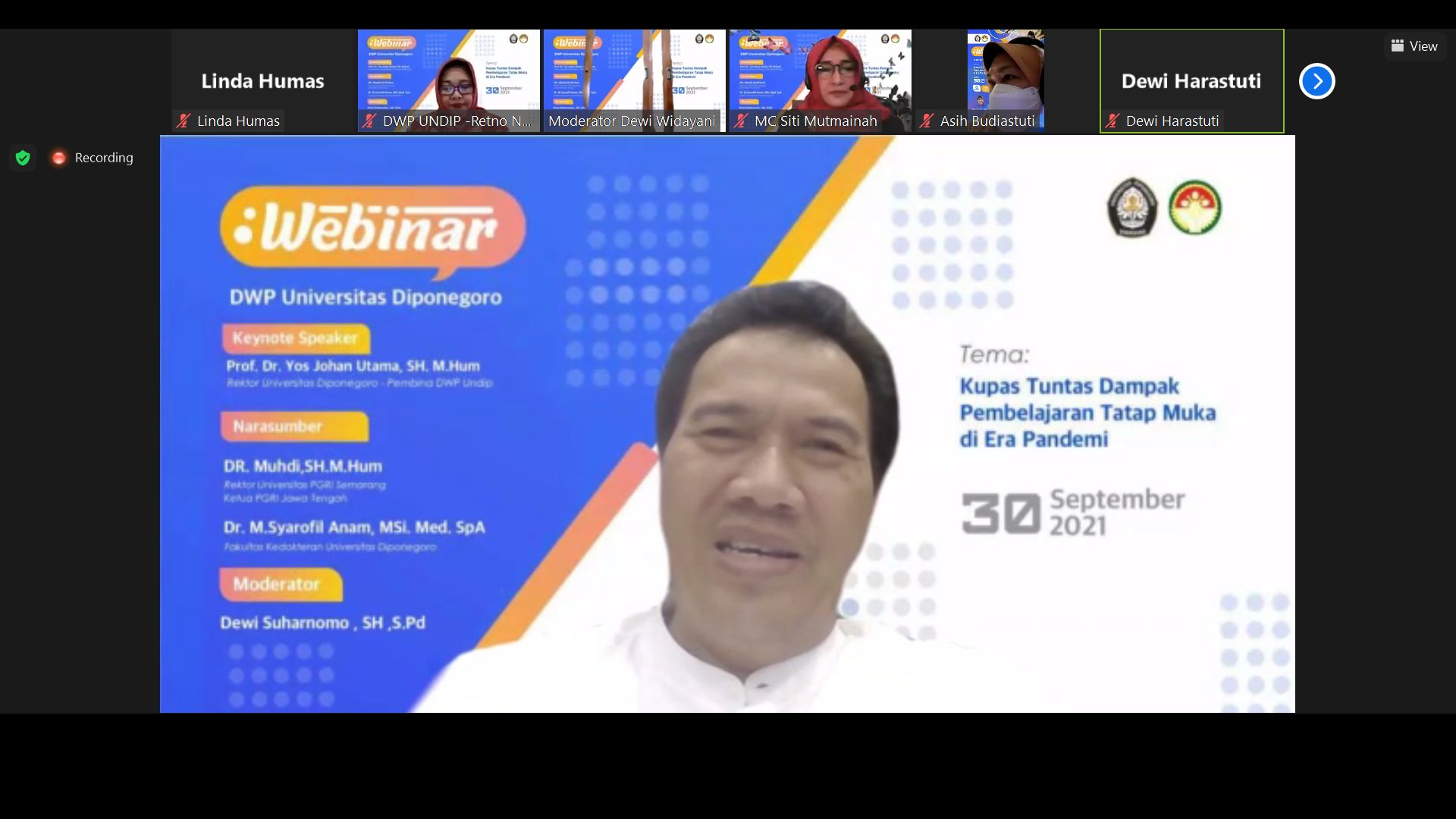“This webinar is expected to be able to answer questions about face-to-face learning, because many parents are still worried, especially regarding the development of the Covid-19 virus. For this reason, we all must support the steps taken by the government, schools and campuses, as well as send prayers so that we will achieve what we want and this pandemic will end soon. Hopefully the materials conveyed by resource persons will provide solutions and mutual benefits regarding face-to-face learning in the pandemic era,” stated Asih Yos Johan Utama, SH. CN., as Chair of Dharma Wanita Persatuan (DWP) of Diponegoro University. These statements conveyed at Webinar by UNDIP DWP with the theme “Explaining Completely the Impact of Face-to-face Learning in the Pandemic Era” (30/9).
Meanwhile, in his speech, Undip Rector, Prof. Dr. Yos Johan Utama, SH. M.Hum, conveyed that the impact of the pandemic was very broad, resulting in many deaths. However recovery stage is slowly progressing if it is seen from the significant decline of Covid-19 number of cases. Self-isolation has begun to reduce as well as hospital rooms are also empty. When this recovery stage occurs, it must be remembered that there are still other places that still have the intensity of the Covid-19 emergency.
“Students and lecturers may be bored with these online learning activities, linger in front of the screen and some students have difficulty finding internet signals. Now, when there have been efforts to carry out face-to-face learning, of course there is a feeling of anxiety because there are fears of the virus spread. According to Circular Letter of Rector, Undip is still carefully making the best decision. Classes that are usually filled with 70 people can only be filled by 20% of them. Even those who are allowed to register are those who have been vaccinated and only those who have ID card of Semarang residents,” he said.
“There are many processes must be carried out because on the one hand this face-to-face learning pattern contains risks, such as death. To avoid the risks, Undip asked permission from parents. There are some things that we cannot be sure of in dealing with this Covid-19 virus, for example the emergence of new clusters. We can discuss many variables and factors in this webinar to answer the impact of face-to-face learning in the pandemic era,” explained the Rector.
Dr. Muhdi, S.H., M.Hum. (Rector of PGRI University Semarang) delivered material about “School Readiness in the Implementation of Face-to-Face Learning”. The purpose of education is to develop the potential of students to become human beings who are faithful to God, healthy, knowledgeable, capable, creative, independent, having noble character, as well as becoming democratic and responsible citizens. In the digital era or the industrial revolution, no matter how good or smart a person is, soft skills are needed to become a successful person. Some of important soft skills including willingness to learn, ability to learn, collaboration, independence and creativity.
“Efforts made by teachers or schools in overcoming the problem of Online Learning such as taking lessons at village halls or other places to get internet networks. Teachers who visit students in groups are not necessarily better or safer than face-to-face learning at schools with a limited number of participants. The impact of Online Learning during the pandemic era including risk of dropping out of school, abnormal growth and development of children, both in terms of cognitive and character, as well as psychosocial development and domestic violence,” he said.
According to him, whether Online Learning is safe for students or not depends on the family and their environment. Online Learning also allows students at home to play together, gather together and to not wear masks without supervision, especially for students from lower-middle class families.
“The most rational solution is to carry out blended learning. It would be carried out by implementing strict health protocols and flexible system of class. Health is the most important aspect in life nowadays, but education is also important. In this pandemic era, sooner or later face-to-face learning must gradually begin with school records in accordance with regulations and health protocols. Next, collaboration is carried out with all parties, between parents, schools and the community, to remind each other to be discipline and obedience to health protocols,” explained Dr. Muhdi.
Next material is delivered by dr. M. Syarofil Anam, MSi. Med., SpA (Lecturer of Faculty of Medicine Undip) about “The Aspects of Child Health in the Implementation of Face-to-Face Learning”.
“The principle of education policy during the Covid-19 pandemic has become a decision for the sake of community. The health and safety of students, educators, educational staffs, families, and the community is a top priority in setting learning policies. Face-to-face learning in school during pandemic is considered if the parameters are met, including the right control of outbreak of cases; declining number of new cases; the readiness of health system in handling cases; health facilities with supporting infrastructure; readiness of schools to carry out face-to-face learning with implementing health protocols and making sure that all teaching staffs and school community have not been exposed to the virus and have been vaccinated,” he explained.
dr. Syarofil concluded that a child is a vulnerable person whose rights must be protected. Since Covid-19 can seriously affect children’s conditions, efforts to implement face-to-face learning at school should pay attention to the condition of children and involve parents in every step of its implementation. The basics of health protocols must be understood by children by educating them according to their stages of development.
“Health is not only a matter for health workers but for all of us. Health and the right to life are the main rights for children. In terms of health, as parents we have to set an example for our children, for example by always wearing masks,” he concluded. (Linda – Public Relations)
Translated by: Titis (Public Relations)
|
BalasTeruskan
|

